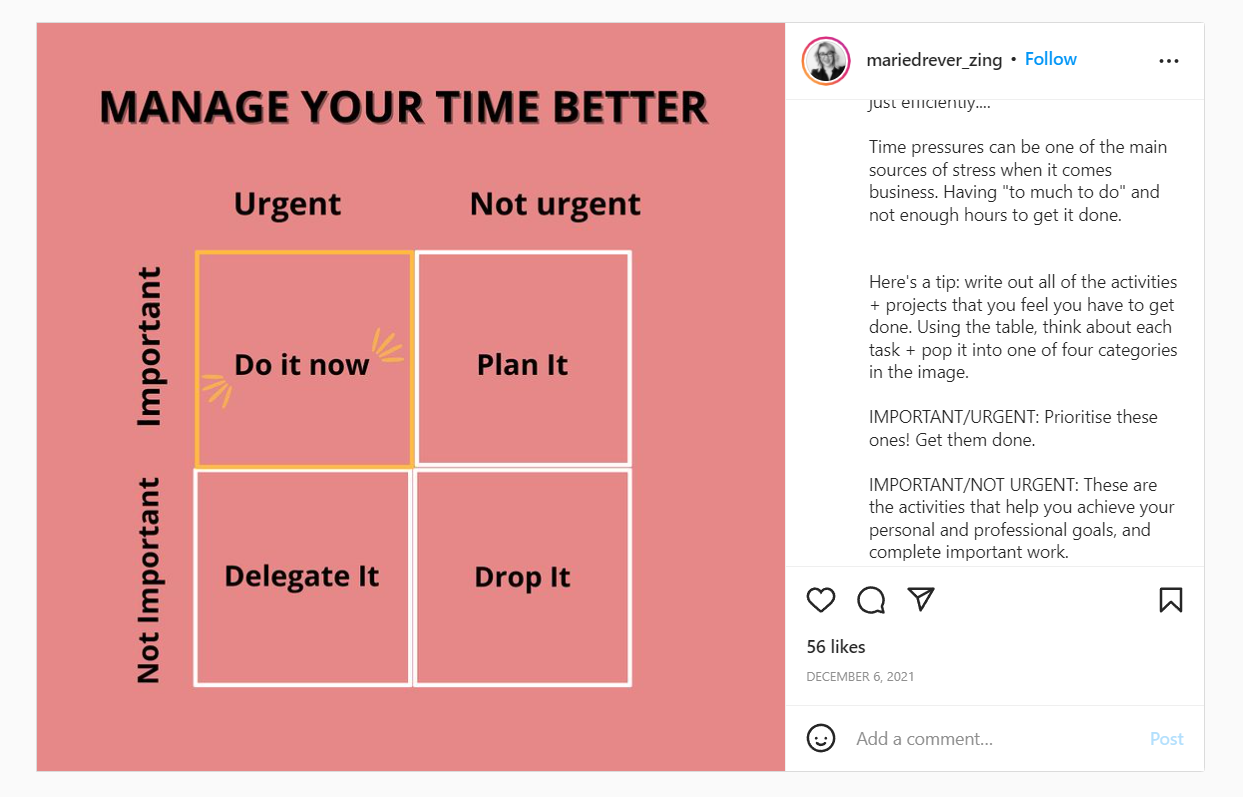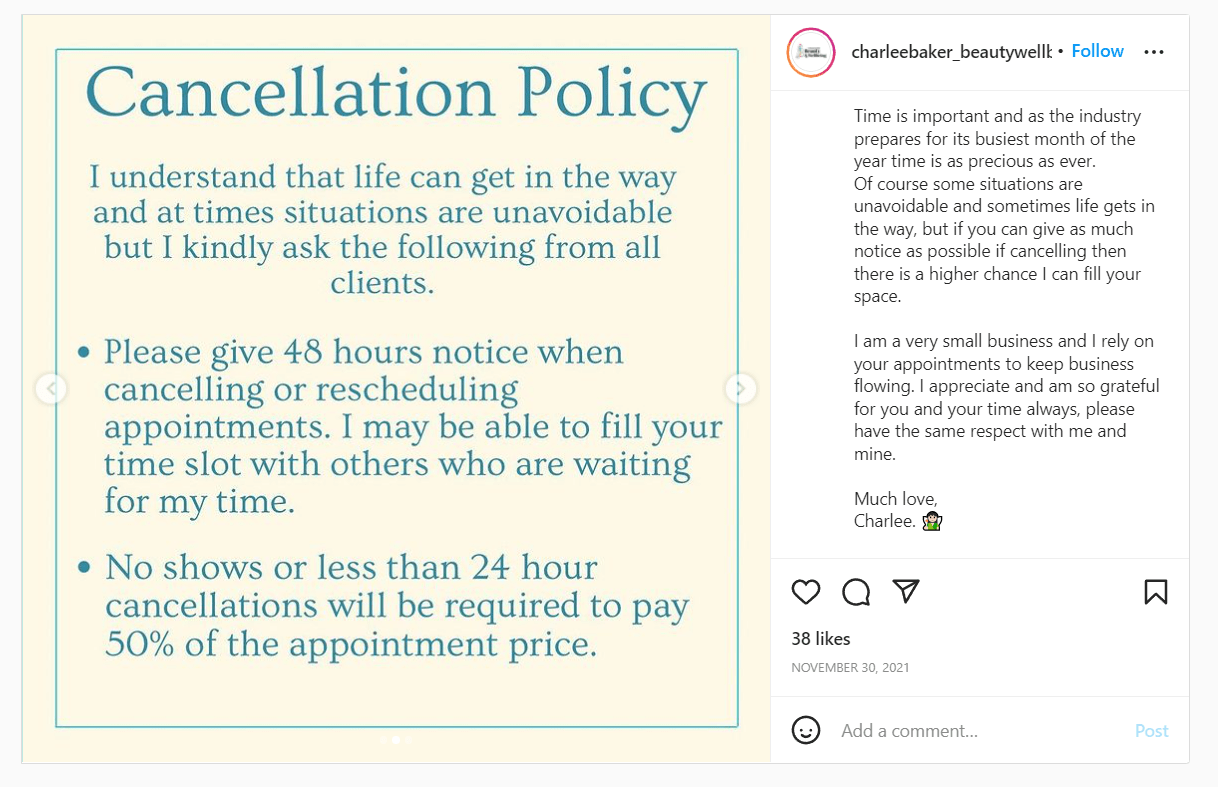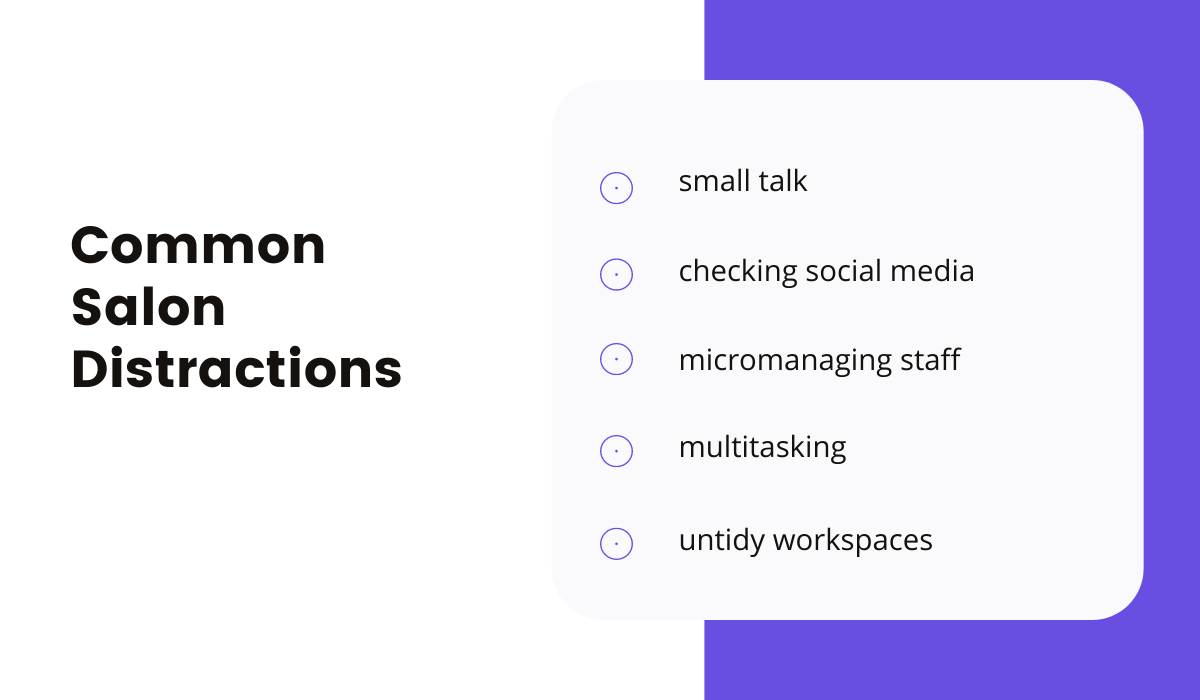
Managing a salon often takes more time than you have. With these seven time management tips, you’ll be able to get the most out of your time and lead your business to success.
As a salon manager, you probably wear so many hats that people sometimes confuse you for a millinery shop.
However, taking on too many roles and rushing from task to task puts a strain on your schedule and leaves you too exhausted to cross all the items off your ever-growing to-do list.
To help you regain control of your time and make your salon thrive, we’re bringing you seven tips for effective salon time management.
Running a salon means dealing with an endless to-do list. If you’re not putting out fires dealing with daily crises at the salon, you’re strategizing long-term plans. All these activities can be a lot to work into a schedule, which is why you should prioritize tasks appropriately.
In this section, we’re going to go over some tips on how to do just that, provided by experienced salon coaches; they’ve seen it all in their time collaborating with numerous salons.
Marie Drever, a salon business coach with 20 years of experience, suggests grouping tasks according to importance and urgency. If something is both important and urgent, you should do it immediately.
However, if a task is crucial for the salon but not that urgent, Drever suggests you find a place in your schedule to tackle it later.
You can find a table depicting the scheme below.

Source: Instagram
For instance, if you’re understaffed, hiring should make it to the top of your to-do list.
On the other hand, while composing PDFs with aftercare recommendations can improve salon customer service, the task can hardly be considered urgent. So, you can either delegate it to one of your beauticians with extra time between their clients or plan to do it later during the week.
When you get to writing down all tasks that you need and want to do, together with short-term and long-term goals for the salon, it’s easy to get overwhelmed.
In such cases, it’s helpful to remind yourself that not all of the tasks require immediate attention.
This tip was brought to you by Valerie Delforge, a business strategy consultant specializing in salons and spas.
In fact, Delforge learned this piece of advice early on in her career from one of her managers.
“The minute you realize that you will never finish your to-do list will be the minute you will feel better about it. It’s all about managing that list of tasks. It’s about taking control of what you can control, and letting go of circumstances that you can’t.”
Our final tip for prioritizing is to set deadlines for each task and revisit your progress each week or month. This approach will help you regain control and focus on solving tasks rather than endlessly reorganizing them.
The Achilles’ heel of many salon owners is the tendency to take over all the tasks themselves, from booking to accounting.
However, when you get so accustomed to the way you perform such activities, it’s hard to see when they become ineffective and replace them with better ones.
Let’s start with a common struggle that hinders salon time management: inefficient booking.
How many hours do you spend weekly sifting through WhatsApp and Messenger messages to book appointments for your clients?
The answer is likely too many.
You could save plenty of time by choosing an online booking system, such as Zoyya, our software solution designed with salons in mind.
Our clients report spending significantly less time on booking after implementing Zoyya.

Source: Zoyya
For instance, the IPL studio Nomasvello is usually crowded due to the popularity of the treatments.
The owner states that the studio needs “very good time organization and management practices” to handle all clients efficiently, and Zoyya has helped them immensely.
Another obstacle salons often face on the way to efficient time management is meetings. If you conduct regular meetings to manage your staff better, you might want to reconsider their timing.
Let’s say you have staff meetings every Friday morning.
While that’s great for establishing structure and organization, it may be better to replace meetings with emails when appropriate, freeing up some time during the busiest hours.
You could also shift meetings to right before opening or after closing so that they don’t eat into productive time.
Either way, you should be able to recognize which practices in your salon are unproductive and replace them with more effective ones.
There’s nothing worse than planning your day meticulously only to have a forgetful client mess up your schedule. When you manage to reduce cancellations, you’ll be able to take back control of your time.
Reducing cancellations is easier said than done. After all, you can’t control other people. You can, however, incentivize them to arrive on time.
Our golden tip for time management in salons is to [establish a cancellation policy](https://zoyya.com/en/partner/blog/salon-cancellation-policyand reinforce it consistently.
The policy doesn’t have to be complicated; it’s sufficient to describe how early clients should let you know they won’t be able to make it to the appointment and if there are any fees for late cancellations.
Carlee Baker, a beauty therapist, managed to fit the info we’ve just mentioned into two sentences on Instagram.

Source: Instagram
Deposits can also help you incentivize clients to arrive on time.
When clients deposit a portion of the price, they’re less prone to no-shows because they’ve already invested their money in your service.
Here’s how Baker supplemented her cancellation policy with rules on deposits.

Source: Instagram
Asking for deposits allows you to make money—or at least not lose it—when clients miss their appointments.
Still, deposits don’t bring as much income as full services, so you could consider implementing waiting lists.
That way, you’ll be able to fill in last-minute cancellations and lessen their impact on your schedule and income.
What if we told you there’s a way to free up your schedule and still get all the tasks done? That’s right; we’re talking about delegation.
Imagine you’re running a beauty salon, and one of the services you offer is permanent makeup.
While you wouldn’t ask your receptionist to tattoo a client’s eyebrows, you could definitely ask them to create social media posts advertising the service.
So, the crucial factor of successful delegation is identifying your employees’ skills and strengths and playing to them.
Besides unburdening your schedule, such an approach can also make employees feel more empowered and engaged on the job because they know you trust them.

Source: Zoyya
The easiest element to delegate to salon staff is social media work.
Why would you interrupt your daily activities to snap Instagram stories of fresh manicures when each of your employees can carry out that task on the go?
When it comes to delegating more significant social media posts, you can assure the quality by providing your staff with your salon’s guidelines on voice and tone and visuals such as colors, fonts, and logos.
In the beginning, you could review posts before they go live to make sure they’ll contribute to your online reputation.
You could also delegate parts of onboarding.
Letting your beauticians onboard the new hire will help them connect with the team they’ll work with every day and allow you to focus on tasks where your expertise is needed.
All in all, delegating will help you manage your time more efficiently. If you’re reluctant to hand over the reins, remember that you’ve hired each of your talented employees for a reason.
Once you start completing the tasks on your to-do list, it’s vital to stay focused. A task that takes ten minutes to complete often stretches to half an hour or more unless you prevent distractions, both self-imposed ones and those from other people.
It takes one social media notification to take you down the rabbit hole on Instagram. Twenty minutes later, your coffee is cold and the email to the wax supplier is not even drafted.
Social media is just one example; there are many more distractions you may be unintentionally succumbing to, such as indulging in too much small talk, or the way you interact with your employees.

Source: Zoyya
For instance, many salon managers constantly oversee even the experienced beauticians to ensure the treatments they provide are perfect.
Such behavior that borders micromanagement doesn’t help your employees get any better; it only distracts you from the work you should be doing.
A great tip here is to consciously try to recognize the activities distracting you from priority work. You’ll probably find more of them than you think.
When you identify what these activities are, you’ll be able to self-regulate when you notice you’re doing them, and get back to work as soon as you start drifting away from the to-do list.
Shifting gears,for example, from marketing activities to administrative work takes time, so you should aim for batching similar activities together to improve your efficiency.
If there are fifteen tasks on your to-do list for a given day, going through them in order may seem like the easiest approach.
However, that may lead you to go to the front desk for the first task, shuffle to the storage supply room for the second task, and then back to the office for the next one.
A more effective way to carry out your assignments is by batching similar tasks into groups.
For example, you could group all administrative tasks and do them all at once while no one bothers you in the office.
Valerie Delforge, the salon coach we’ve mentioned earlier, had a similar approach. She used a scarf to make sure she would be able to complete her office tasks undistracted. Let’s see how!
As a salon manager, Delforge was struggling with organizing her time. She then decided to take a few hours a day when she would close the doors of her office to her staff to maximize her bursts of productivity.
Since Delforge generally had an open-door policy, she would put a scarf on her door to indicate when she didn’t want to be disturbed.

Source: Zoyya
This method allowed her to stop moving all over the salon as she switched from task to task. Instead, she sat down each day to do office work only and moved on to the other activities after that first batch was finished.
So, before rushing to handle the tasks in the order they’re listed, you should consider if there’s a more efficient way to categorize them.
With an overwhelming number of tasks competing for your attention, it can be difficult to get started.
Our final tip for better time management in salons is to avoid procrastination, a bad habit that’s almost universal in the workforce—including managers and business owners.

Source: Zoyya
If you catch yourself dreading a task, you might as well tackle it right away to eliminate the anxiety.
Routine tasks, such as answering client inquiries daily, usually don’t pose a problem. But when it comes to larger or unpleasant tasks, most of us tend to postpone them.
This practice costs salons hours and hours of time that could have been spent more productively.
Deadlines are a helpful tool here. Rather than phrasing a task as find a new pigment powder supplier, try using more actionable language, like find a new pigment powder supplier by the end of the week.
That way, you’ll see a manageable goal instead of an abstract obligation, and you’ll feel more motivated to get it done.
A different tip for managing salon procrastination is to do some prep work before starting with the task.
Let’s reuse the pigment supplier example.
If the thought of spending hours browsing, comparing prices, and researching the specifics of ingredients sounds too intimidating, you could take 20 minutes a few days earlier to write down all the steps you need to take for this task.
Once you actually start handling the task, you’ll have an outline of the process, making the activity seem more manageable.
There isn’t a magic trick that could squeeze in a few more hours in your day, but there are ways you can manage the time you have more efficiently.
With proper time management, you’ll be able to get all tasks done and still have enough time to work on growing your business.
Organize, delegate, automate—do whatever works for you. And remember, it doesn’t matter who does a task, as long as the task is done right.
We never send spam or share your email address.
We use cookies to enhance your browsing experience, serve personalized ads or content, and analyze our traffic. By clicking "Accept", you consent to our use of cookies.Read our cookie policy